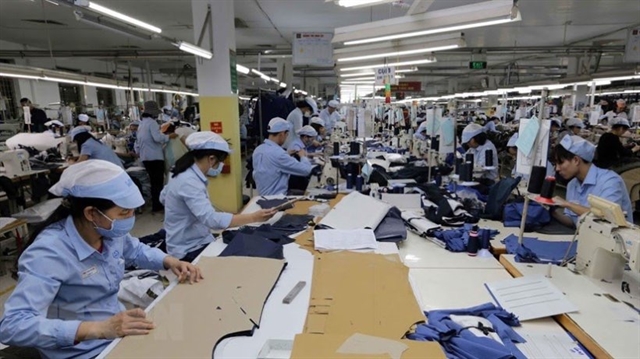 Economy
Economy


|
| A garment company in Bình Dương. Garment and textile companies need to develop a strategy for digital transformation to ensure their survival and future development. — VNA/VNS photo |
HCM CITY — Garment and textile companies need to develop a strategy for digital transformation to ensure their survival and future development, a seminar heard in HCM City yesterday.
Brad Park of Global Dyeing Company said consumers were demanding more and changing quickly.
Production needs to follow consumers’ demand so that production and delivery times are reduced, according to Park.
Besides, consumers also pay closer attention to companies’ corporate social responsibility and environmental protection.
Companies must work to satisfy customers’ demand, reduce the cost, waste and lead time, and improve quality and design, he said.
“Digital transformation would help enterprises respond rapidly to the market,” he said.
"Firms need to identify which processes they need to transform and map out an optimal digital transformation process with the support of technology solution providers.
"But besides improvement in technology, firms also need to improve human resources and pay more attention to environmental protection," he said.
Sam Lee of Inteco, a company that offers consultancy for factory automation, said businesses in many countries were adopting smart manufacturing to replace human workers in a variety of operations.
According to Lee, garment and textile is one of the key industries in Việt Nam with increasing exports in recent years, but manufacturing and exports mainly based on the CMT (cut-make-trim) model, while more advanced business models like Original Equipment Manufacturer (OEM) and Original Design Manufacturer (ODM) remain modest.
Manufacturing based on the CMT model requires a large number of workers, resulting in high production costs, and automation will help reduce them.
Lee spoke about the success achieved by South Korea’s Hansae Co Ltd., an OEM manufacturer and exporter of apparel, saying automation had helped the company increase its revenues strongly between 2016 and 2019.
Park said Việt Nam’s textile industry had great potential for development.
With its experience in global operations, his company wants to join hands with the Việt Nam Textile and Apparel Association to “lead innovation for smart, green manufacturing in Việt Nam.”
“Transform digitally or die. We must join hands to develop together.”
The seminar also discussed the online exhibition trend and B2B biz-matching.
Jun Chol, director of the Coex Vietnam representative office, said COVID-19 had greatly impacted the business-to-business exhibition industry across the world.
Virtual exhibitions offered new opportunities for manufacturers, eliminating geographical barriers so that companies could reach a much larger audience, he said.
But physical exhibitions could not be replaced by online ones, and would resume after the pandemic, he said. There would be a rising trend of online-offline models, he said.
Themed Digital transformation in the textile and garment sector to overcome the COVID-19 pandemic, the two-day seminar was organised by VITAS and the Korea Institute of Industrial Technology.
Today the seminar will discuss virtual fashion and 3D design.
The event seeks to share new global technological trends and enhance co-operation between the Korean and Vietnamese garment and textile industries. — VNS




